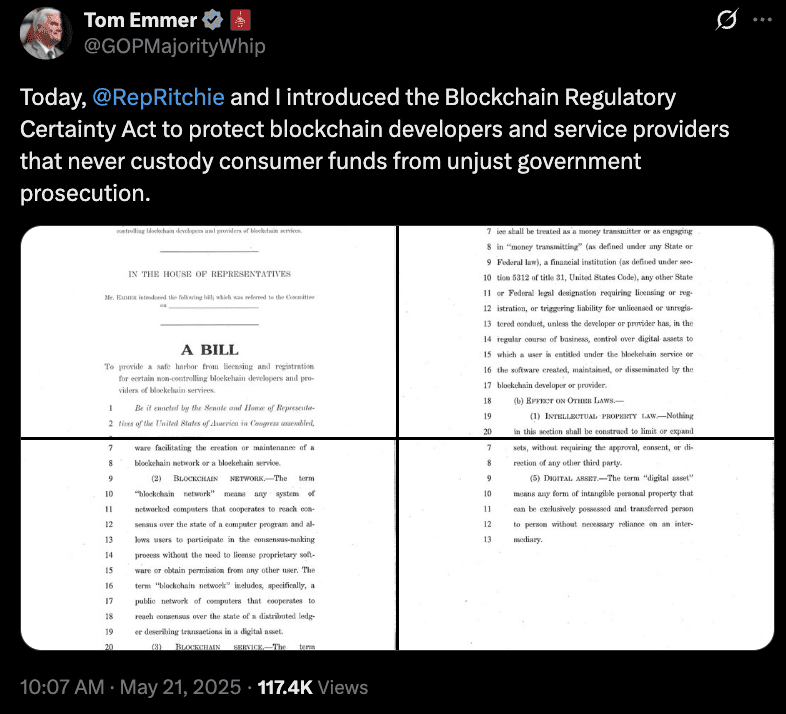The U.S. Congress is once again considering the Blockchain Regulatory Certainty Act, a bill designed to provide clarity on the regulatory landscape for blockchain technology and digital assets. Representatives Tom Emmer and Ritchie Torres are leading this bipartisan effort, aiming to establish a clear framework for developers and service providers operating in the crypto space.
What is the Blockchain Regulatory Certainty Act?
The Blockchain Regulatory Certainty Act seeks to define which entities involved in the blockchain ecosystem should be considered money transmitters. Specifically, the bill aims to exempt digital asset developers and service providers who do not custody consumer funds from being classified as money transmitters. This clarification is intended to foster innovation by reducing regulatory uncertainty for those building and maintaining blockchain infrastructure.
According to Emmer, the bill aims to solidify that digital asset developers and service providers that do not custody consumer funds are not money transmitters.
The implications of being classified as a money transmitter are significant. Money transmitters are subject to a complex web of regulations, including licensing requirements, anti-money laundering (AML) compliance, and Know Your Customer (KYC) obligations. These regulations can be burdensome and costly, potentially stifling innovation and driving businesses out of the U.S.
Bipartisan Support
While the bill initially faced challenges, the renewed effort has garnered bipartisan support, with Democratic Representative Ritchie Torres joining Republican Representative Tom Emmer as a co-lead. This collaboration underscores the growing recognition of the importance of blockchain technology and the need for clear regulatory guidelines.
Torres has stated, “The Blockchain Regulatory Certainty Act reflects a thoughtful, bipartisan effort to get digital asset policy right. While similar language was voted down in markup last Congress, we took that feedback seriously and returned with a smarter, sharper framework that protects innovation without compromising oversight.”

Industry Support
The Blockchain Regulatory Certainty Act has received backing from several advocacy organizations within the crypto industry. Groups like the Crypto Council for Innovation, Solana Policy Institute, Digital Chamber, Coin Center, DeFi Education Fund, and Blockchain Association have voiced their support for the proposed legislation. Their collective stance highlights the industry’s desire for a clear and predictable regulatory environment.
Challenges and Opposition
Despite the bipartisan support and industry backing, the bill still faces hurdles. Some Democratic lawmakers, including Representative Maxine Waters, have expressed concerns about President Donald Trump’s connections to the crypto industry. These concerns stem from Trump’s family’s stake in World Liberty Financial and the emergence of the TRUMP memecoin. Waters and others have suggested they may block crypto-related legislation until these potential conflicts of interest are addressed.
The Memecoin Factor
The rise of memecoins, often characterized by their speculative nature and lack of intrinsic value, has also added complexity to the regulatory debate. The association of prominent figures like Donald Trump with memecoins has raised questions about market manipulation and investor protection.
The situation is further complicated by Trump’s plans to host a dinner with individuals holding significant amounts of his memecoin, raising ethical concerns and potentially fueling accusations of insider trading.
Looking Ahead
The future of the Blockchain Regulatory Certainty Act remains uncertain. The bill’s success will depend on navigating the complex political landscape, addressing concerns about potential conflicts of interest, and demonstrating the benefits of a clear regulatory framework for blockchain technology.
Key Takeaways:
- The Blockchain Regulatory Certainty Act aims to clarify the regulatory status of digital asset developers and service providers.
- The bill has bipartisan support but faces opposition due to concerns about Donald Trump’s crypto ties.
- The rise of memecoins adds another layer of complexity to the debate.
As the debate unfolds, it is crucial to consider the potential impact of regulation on innovation, investor protection, and the future of the blockchain industry in the United States. A balanced approach that fosters innovation while safeguarding against illicit activities is essential for realizing the full potential of this transformative technology.